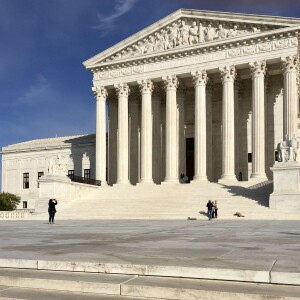
MCELRATH v. GEORGIA
Damian McElrath was charged with malice murder, felony murder, and aggravated assault -- all related to the death of his mother. A jury returned a split verdict. For the malice-murder charge, finding him “not guilty by reason of insanity” and “guilty but mentally ill” to the other counts. The Georgia Supreme Court stated that because these findings were inconsistent by finding different mental states, he should be retried under the Georgia "repugnant" doctrine. McElrath argued he could not be re-tried because of the Fifth Amendment's protection against double jeopardy.
"Held: The jury’s verdict that McElrath was not guilty of malice murder by reason of insanity constituted an acquittal for double jeopardy purposes notwithstanding any inconsistency with the jury’s other verdicts.
(a) The Double Jeopardy Clause provides that “[n]o person shall . . . be subject for the same offence to be twice put in jeopardy of life or limb.” 5th Amendment. “[I]t has long been settled under the Fifth Amendment that a verdict of acquittal is final, ending a defendant’s jeopardy, and . . . is a bar to a subsequent prosecution for the same offence.” Green v. United States. The Court’s “cases have defined an acquittal to encompass any ruling that the prosecution’s proof is insufficient to establish criminal liability for an offense.” Evans v. Michigan. Once rendered, a jury’s verdict of acquittal is inviolate. The principle “that ‘[a] verdict of acquittal . . . could not be reviewed, on error or otherwise,’ ” is “[p]erhaps the most fundamental rule in the history of double jeopardy jurisprudence.” United States v. Martin Linen Supply Co.. Whatever the basis for a jury’s verdict, see Bravo-Fernandez v. United States, the Double Jeopardy Clause prohibits second-guessing the reason for a jury’s acquittal.
(b) Georgia law specifically provides that a defendant who establishes an insanity defense “shall not be found guilty of [the] crime.” Ga. Code. Here, the jury concluded that McElrath was not guilty by reason of insanity with respect to the malice-murder charge. That verdict was unquestionably a “ruling that the prosecution’s proof is insufficient to establish criminal liability for an offense,” Evans, and thus an acquittal. Georgia argues that there was no valid verdict pursuant to Georgia law, and thus no acquittal. But whether an acquittal has occurred for double jeopardy purposes is a question of federal law, and a State’s characterization of a ruling is not binding on the Court. Smalis v. Pennsylvania. While States have the power “to regulate procedures under which [their] laws are carried out,” Patterson v. New York, the ultimate question remains whether the Double Jeopardy Clause recognizes an event as an acquittal. The jury’s verdict of not guilty by reason of insanity here constituted such a determination, and it is of no moment that the verdict was accompanied by other verdicts appearing to rest on inconsistent findings. An acquittal is an acquittal, even when a jury returns inconsistent verdicts. Bravo-Fernandez. Georgia argues that the bar to second-guessing an acquittal applies only to general verdicts, but the Court’s cases prohibit any speculation about the reasons for a jury’s verdict of acquittal—even when, as here, specific jury findings provide a factual basis for such speculation. To do otherwise “would impermissibly authorize judges to usurp the jury right.” Smith v. United States. "
Reversed and Remanded. JACKSON, J., delivered the opinion for a unanimous Court.
Justice Alito filed a concurring opinion noting that he believes this decision is limited only to review of an acquittal (as the trial judge found here), but it does not apply when a trial judge refuses to accept an inconsistent verdict at trial.
Read by Jake Leahy.
More Episodes
 2018-02-21
2018-02-21
 2018-02-21
2018-02-21
 2018-02-20
2018-02-20
 2018-02-20
2018-02-20
 2018-02-18
2018-02-18
 2018-02-17
2018-02-17
 2018-02-11
2018-02-11
 2018-02-09
2018-02-09
 2018-02-09
2018-02-09
 2018-02-09
2018-02-09
Create your
podcast in
minutes
- Full-featured podcast site
- Unlimited storage and bandwidth
- Comprehensive podcast stats
- Distribute to Apple Podcasts, Spotify, and more
- Make money with your podcast
It is Free
- Privacy Policy
- Cookie Policy
- Terms of Use
- Consent Preferences
- Copyright © 2015-2024 Podbean.com





